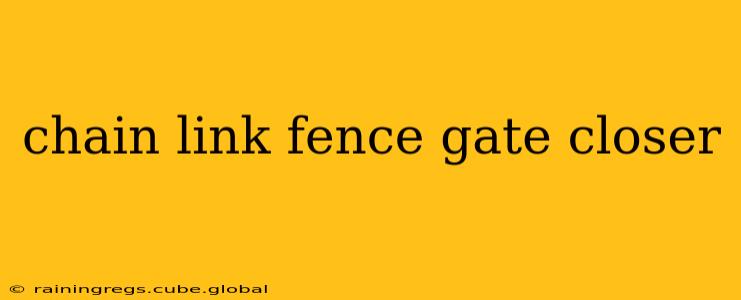Choosing the right chain link fence gate closer can significantly improve the security and longevity of your fence. This comprehensive guide explores various types, installation considerations, and factors to consider when selecting the perfect closer for your needs. We'll also address some frequently asked questions to ensure you make an informed decision.
What are the Different Types of Chain Link Fence Gate Closers?
Several types of chain link gate closers cater to different needs and budgets. The most common include:
-
Spring Closers: These utilize a powerful spring mechanism to automatically close the gate. They are typically the most affordable option and offer reliable performance for lighter gates. However, they might not be suitable for heavier gates or areas with strong winds.
-
Hydraulic Closers: These closers use hydraulic fluid to control the closing speed, offering a smoother and more controlled closure. They are ideal for heavier gates and areas prone to strong winds, providing a more consistent and gentler closing action. While more expensive than spring closers, their durability and performance often justify the cost.
-
Self-Closing Hinges: These hinges incorporate a spring mechanism directly into the hinge itself. They are a simpler solution, suitable for lighter gates, offering a more compact installation.
-
Electric Closers: These advanced closers use an electric motor to close the gate, often integrated with access control systems. They're suitable for high-security areas or applications requiring remote operation.
How Do I Choose the Right Chain Link Fence Gate Closer?
Selecting the appropriate chain link gate closer involves considering several crucial factors:
-
Gate Weight: This is arguably the most critical factor. Heavier gates demand stronger closers, usually hydraulic, while lighter gates can accommodate spring closers or self-closing hinges.
-
Gate Size: Larger gates require closers with a higher closing force to ensure reliable operation.
-
Wind Conditions: Areas with strong winds necessitate closers that can withstand the force and prevent the gate from being blown open. Hydraulic closers generally excel in such conditions.
-
Budget: Spring closers are the most economical option, while hydraulic and electric closers represent a higher investment.
-
Security Requirements: For high-security applications, an electric closer integrated with an access control system might be necessary.
How Do I Install a Chain Link Fence Gate Closer?
Installation procedures vary depending on the type of closer. Always consult the manufacturer's instructions for detailed guidance. Generally, the process involves attaching the closer to the gate and the fence post, ensuring proper alignment and adjustment of the closing speed and force. Improper installation can lead to malfunction or damage. If you're unsure, consider seeking professional assistance.
What is the Best Chain Link Fence Gate Closer for Heavy Gates?
For heavy gates, a hydraulic closer is generally recommended. Their controlled closing action and robust construction can handle the weight and provide reliable operation, even in challenging conditions.
How Much Does a Chain Link Fence Gate Closer Cost?
The cost varies significantly depending on the type and brand. Spring closers are the most affordable, typically ranging from $20 to $50. Hydraulic closers can cost anywhere from $50 to $200 or more, while electric closers represent a considerably higher investment.
How Long Do Chain Link Fence Gate Closers Last?
The lifespan depends on several factors, including the quality of the closer, the frequency of use, and environmental conditions. With proper installation and maintenance, a well-built closer can last for many years, often five to ten years or even longer.
What Maintenance Do Chain Link Fence Gate Closers Need?
Regular maintenance can significantly extend the life of your gate closer. This might include lubricating moving parts, checking for wear and tear, and ensuring proper alignment. Consult your manufacturer's instructions for specific maintenance recommendations.
By carefully considering these factors and choosing the appropriate closer, you can significantly enhance the security, convenience, and longevity of your chain link fence. Remember, professional installation is always recommended if you're unsure about DIY installation.
